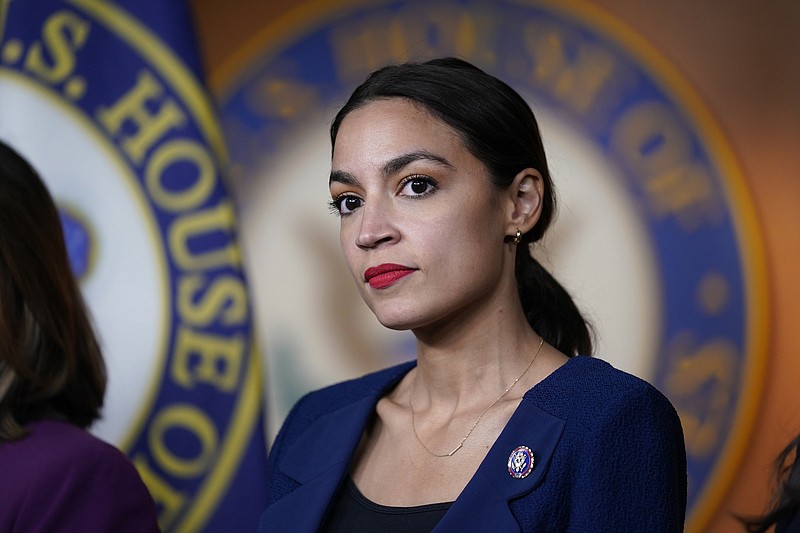WASHINGTON -- One side is energized by the prospect of the greatest expansion of government support since the New Deal nearly a century ago. The other is fearful about dramatically expanding Washington's reach at an enormous cost.
They're all Democrats. Yet each side is taking different approaches to guiding the $3.5 trillion spending bill through Congress.
The party is again confronting the competing political priorities between its progressive and moderate wings. The House version of the bill that was drafted this week ushered in a new phase of the debate that stands to be seen as a test of whether Democrats can match their bold campaign rhetoric on everything from income inequality to climate change with actual legislation.
Any stumble may have serious consequences for Democrats' prospects during next year's midterms, when they'll try to prevent Republicans from retaking Congress. The finished product stands to alienate centrists who say it goes too far, or frustrate those on the left who argue it's too timid at a moment of great consequence.
"This is critically important for Democrats and for their message in next year's election," said former U.S. Rep. Joe Crowley of New York, a veteran Democrat who was upset in the 2018 primary by progressive star, Alexandria Ocasio-Cortez. "We're going to blink and we're going to be in 2022."
Crowley said bills proposing trillions of dollars in spending were "simply something I never had to deal with in my 20 years" in office. "These are enormous figures by any standard," he said.
[Video not showing up above? Click here to watch » arkansasonline.com/917inflection/]
But, Crowley added, no matter the final price tag, "Let's not lose sight of the fact that this will be transformational regardless."
With Republicans universally opposed to the bill, Democratic leaders have a narrow path as they navigate an evenly divided Senate and thin House majority.
Many Democrats agree on the goals included in the legislation, such as providing universal prekindergarten and tuition-free community college while increasing federal funding for child care, paid family leave and combating climate change. The party also is aiming to expand health care coverage through Medicare and create pathways to citizenship for millions of people in the country illegally.
But there are differences over how much such a measure should cost and how it should be paid for.
Democratic Sens. Joe Manchin of West Virginia and Kyrsten Sinema of Arizona, who met privately with President Joe Biden on Wednesday, have balked at the $3.5 trillion cost.
House Democrats, meanwhile, have proposed a 26.5% top corporate tax rate to help cover the cost. That's less than Biden's 28% target. But Manchin has pushed for an even lower corporate rate of 25%.
There are also divides over how to impose levies on top earners. Biden has advocated restoring the top tax rate on capital gains to 39.6%. House Democrats, however, would tax such income, which is often generated by the wealthy, at 25%. They also would impose a 3% surcharge on individual income above $5 million.
While such differences are technical, they represent a desire among many House Democratic leaders to protect their most vulnerable members in moderate districts from attacks that they support profligate taxes and spending.
"There's a supposition by our friends on the progressive left that it hardly matters what you do, as long as it's big," said Will Marshall, president of the Progressive Policy Institute, a centrist Washington think tank. Instead, Democrats are ideologically diverse enough that "people who run in competitive races simply can't embrace the same kind of ideas that people who run in safe, blue Democratic districts," Marshall said.
Joseph Geevarghese, executive director of the progressive activist group Our Revolution, countered that "It would be incredibly problematic for the president to say, 'Look we won both chambers of Congress. We won the White House. We couldn't deliver better health care, we couldn't deliver transformational change on the climate.'"
"It is not going to be explainable to the American people," Geevarghese said, "and I think there'll be consequences as a result."
In the House, meanwhile, Rep. Stephanie Murphy, D-Fla., head of the moderate Blue Dog Coalition, opposed parts of the spending package in committee, arguing that her party's effort to muscle it through was too rushed.
Progressives, though, have responded by playing their own legislative hardball. Rep. Pramila Jayapal of Washington, co-chairwoman of the 96-member House Progressive Caucus, said the group remains unified behind a vow not to support a separate bill that many moderate Democrats are more excited about -- a $1 trillion, bipartisan public-works measure -- until the budget bill advances.
"Joe Manchin has power, of course. We need his vote. But so do, really, every single one of us, because in the House, [Democrats] have a margin of three votes," Jayapal said on a conference call with progressive activists. "Everyone's a Joe Manchin here."

